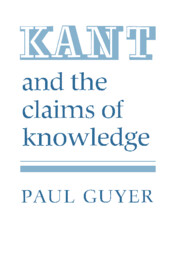Book contents
- Frontmatter
- Contents
- Acknowledgments
- Note on sources
- Introduction
- Part I Kant's early view
- Part II The transcendental deduction from 1781 to 1787
- Part III The principles of empirical knowledge
- Part IV The refutation of idealism
- Part V Transcendental idealism
- Afterword
- Notes
- Index of passages cited
- General index
Afterword
Published online by Cambridge University Press: 09 March 2010
- Frontmatter
- Contents
- Acknowledgments
- Note on sources
- Introduction
- Part I Kant's early view
- Part II The transcendental deduction from 1781 to 1787
- Part III The principles of empirical knowledge
- Part IV The refutation of idealism
- Part V Transcendental idealism
- Afterword
- Notes
- Index of passages cited
- General index
Summary
In the work just completed, I have tried to discover, in all their multiplicity and complexity, Kant's own arguments on the issues in theoretical philosophy which he perceived as most important and to critically assess these arguments on grounds that Kant himself would have recognized as compelling. I have thus attempted to develop my interpretation and criticize Kant's arguments independently of explicit reference to contemporary preoccupations – although if philosophy as we know it is still practiced five or ten decades from now, a future reader of this book would undoubtedly have as little trouble dating the period of its origination as we have in dating Kemp Smith's Commentary or Strawson's Bounds of Sense. The last two decades, however, have witnessed an enormous effort (stemming in large part from Strawson's work) devoted to the “reconstruction” of “Kantian” “transcendental” arguments and to the assessment of the “antiskeptical” prospects of such arguments. Many of these arguments involve issues, especially about the conditions of the possibility of the meaningful use of language, which are quite distant from anything ever considered by Kant himself. In any case, the literature has become so extensive that a systematic survey of it would have to be as large again as the historical study which I have already presented. But at least a few suggestions about how the arguments Kant himself made fare with respect to several of the most prominent issues in this debate will be in order here.
- Type
- Chapter
- Information
- Kant and the Claims of Knowledge , pp. 417 - 428Publisher: Cambridge University PressPrint publication year: 1987
- 12
- Cited by



